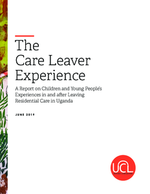Uganda Care Leavers (UCL) was established in 2016 in response to the growing number of children, youths, and adults leaving in child care institutions. UCL set out to first learn from the experiences of care leavers before, during, and after care to gain insight on how institutional care impacted their lives and to determine what (if any) measures should be in place to support this specific group in Uganda.
Where they operate
Organization Type
Main Areas of Work
What They Do
Uganda Care Leavers (UCL) is a social welfare project designed to support children, youths and adults who have spent all or part of their childhood in institutional care (also known as residential facilities, child care facilities and orphanages). UCL is jointly supported by alternative care initiatives and Bula. UCL has formed a network of over 500 care leavers across Uganda. Through this network, care leavers are able to share their experiences, learn from one another, and work together to pursue common goals.
UCL's collected research reflects their experiences as well as their views on growing up in an institution. The findings are shared with key stakeholders such as governmental bodies as well as NGOs so that they can improve upon their approach to child care across the country.
Organization Resources
In order to address the need for evidence-based research about the care leaver experience, a study was facilitated by the Uganda Care Leavers project - sponsored by Alternative Care Initiatives (ACI), a Ugandan NGO, and BULA, a U.S. 501(c)(3) non-profit organization - to conduct peer-led participatory workshops throughout the country. These care leavers, identified by local community leaders and networks, were invited to participate in workshops where they completed surveys about their experiences, the results of which are presented in this report. Survey results are the basis of this study’s recommendations and suggestions for future care reform.


